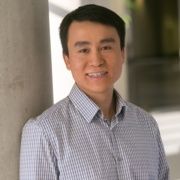
 Wei Li, Ph.D.
Wei Li, Ph.D.
Associate Professor, Pediatrics And Biochemistry And Molecular Biology
500 University Drive
Hershey, PA 17033
“Penn State’s commitment to childhood cancer research enables us to provide innovative treatment to all of our pediatric cancer patients.”
National Institutes of Health, R01 NS119547
“The role and mechanism of necrosis in glioblastoma”
Total Direct Costs: $1,250,000
Annual Direct Costs: $250,000
02/01/2021 – 01/31/2026
Curing Kids Cancer
“Identification of small molecule inhibitors for YAP fusions driven pediatric ependymoma”
$135,000
01/01/2023 – 12/31/2023
Meghan Rose Bradley Foundation
“The Role of Myeloid-Derived Suppressor Cells in Pediatric High Grade Gliomas”
$40,000
09/30/2018-09/29/2019
National Institutes of Health, R01 NS109147
“The role of NONO in TAZ-driven glioma malignant transformation”
Annual Direct Costs: $218,750
Total Direct Costs: $1,093,750
09/01/2018-07/31/2023
DOD NF170073
“Identification and characterization of a novel post-translational modification of Merlin in tumor suppression”
$689,848
05/01/2018 – 04/30/2021
NCI 1K22CA190440
“The mechanism and function of cell competition in tumors”
$535,465
75% PI salary covered
08/01/15 – 07/31/18
American Association for Cancer Research 14-20-10-LI
“The pro-oncogenic role of EZH2 and CRL4DCAF1 in NF2 mutant gliomas”
$100,000
13% PI salary covered
07/01/14 – 06/30/16
American Cancer Society-Institutional Research Grant
“The role of the Hippo pathway in gliomas”
$30,000
0% PI salary covered
12/1/2015 – 11/30/2016
Pediatric Cancer Research Foundation
“The pro-oncogenic role of EZH2 and CRL4DCAF1 in NF2 mutant gliomas”
$25,000
0% PI salary covered
01/01/2016 – 12/31/2016
Research in Dr. Wei Li’s laboratory focuses on studying intercellular interactions during tissue homeostasis and determining how de-regulated interactions among cells promote cell transformation and tumor progression in brain cancer.
The goal of his research is to find molecular targets and biomarkers for cancer therapy. His laboratory integrates molecular, cellular, and biochemical approaches in combination with mouse tumorigenesis models.
Currently, one of his major focuses is elucidating the regulation and function of the Hippo tumor suppressor pathway in brain tumors, including gliomas and neurofibromatosis type 2 associated tumors. In addition, his laboratory utilizes in vitro and in vivo models to dissect biological interactions between heterogeneous malignant cells and to study functional consequences of intra-tumor heterogeneity.
The following are publications of Dr. Li’s lab since 2014:
Pajtler KW, Wei Y, Okonechnikov K, Silva PBG, Vouri M, Zhang L, Brabetz S, Sieber L, Gulley M, Mauermann M, Wedig T, Mack N, Imamura Kawasawa Y, Sharma T, Zuckermann M, Andreiuolo F, Holland E, Maass K, Körkel-Qu H, Liu HK, Sahm F, Capper D, Bunt J, Richards LJ, Jones DTW, Korshunov A, Chavez L, Lichter P, Hoshino M, Pfister SM, Kool M, Li W*, Kawauchi D*. YAP1 subgroup supratentorial ependymoma requires TEAD and nuclear factor I-mediated transcriptional programmes for tumorigenesis. Nature Communications. 2019 Sep 2;10(1):3914. doi: 10.1038/s41467-019-11884-5. PubMed PMID: 31477715; PubMed Central PMCID: PMC6718408.
Wei Y, Yee PP, Liu Z, Zhang L, Guo H, Zheng H, Anderson B, Gulley M, Li W. NEDD4L-mediated Merlin ubiquitination facilitates Hippo pathway activation. EMBO Reports. 2020 Dec 3;21(12):e50642. doi: 10.15252/embr.202050642. Epub 2020 Oct 14. PMID: 33058421; PMCID: PMC7726808.
Yee PP, Wei Y, Kim SY, Lu T, Chih SY, Lawson C, Tang M, Liu Z, Anderson B, Thamburaj K, Young MM, Aregawi DG, Glantz MJ, Zacharia BE, Specht CS, Wang HG, Li W. Neutrophil-induced ferroptosis promotes tumor necrosis in glioblastoma progression. Nature Communications. 2020 Oct 27;11(1):5424. doi: 10.1038/s41467-020-19193-y. PMID: 33110073; PMCID: PMC7591536.
Yee PP, and Li W. Tumor necrosis: A synergistic consequence of metabolic stress and inflammation. Bioessays. 2021 Jul. 43: e2100029. doi: 10.1002/bies.202100029. PubMed Central: PMC8217290.
Wei Y, and Li W. Calcium, an Emerging Intracellular Messenger for the Hippo Pathway Regulation. Frontiers in Cell and Developmental Biology. 2021 9: 694828. doi: 10.3389/fcell.2021.694828. PubMed Central: PMC8275986.
Wei Y*, Luo H*, Yee PP, Zhang L, Liu Z, Zheng H, Zhang L, Anderson B, Tang M, Huang S, and Li W. Paraspeckle Protein NONO Promotes TAZ Phase Separation in the Nucleus to Drive the Oncogenic Transcriptional Program. Advanced Science. 2021 Oct 29. e2102653. doi: 10.1002/advs.202102653. PubMed PMID: 34716691.
Yee PP, Wang J, Chih S, Aregawi D, Glantz M, Zacharia B, Thamburaj K, Li W. Temporal radiographic and histological study of necrosis development in a mouse glioblastoma model. Frontiers in Oncology. 2022. doi: 10.3389/fonc.2022.993649. PubMed Central: PMC9614031.
Zhijun Liu, Yiju Wei, Lei Zhang, Patricia P. Yee, Martin Johnson, Xuexin Zhang, Melissa Gulley, Jennifer M Atkinson, Mohamed Trebak, Hong-Gang Wang and Wei Li. 2019. Induction of store operated calcium entry (SOCE) suppresses glioblastoma growth by inhibiting the Hippo pathway transcriptional coactivators YAP/TAZ. Oncogene, 38(1):120-139. PMCID: PMC6318057
Zhijun Liu, Patricia P. Yee, Yiju Wei, Zhenqiu Liu, Yuka Imamura Kawasawa, Wei Li . 2019. Differential YAP expression in glioma cells induces cell competition and promotes tumorigenesis. Journal of Cell Science, doi: 10.1242/jcs.225714. PMID: 30665893
Lei Zhang, Fangling Cheng, Yiju Wei, Lijun Zhang, Dongsheng Guo, Baofeng Wang, Wei Li. 2018. Inhibition of TAZ contributes radiation-induced senescence and growth arrest in glioma cells. Oncogene, doi.org/10.1038/s41388-018-0626-0. PMID: 30542117